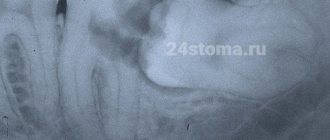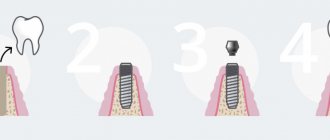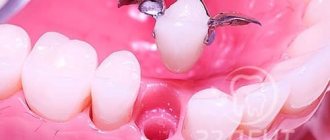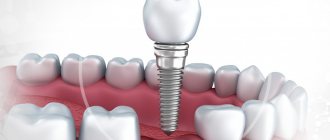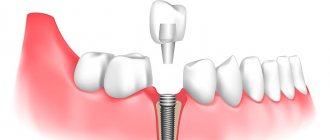Publication date: March 17, 2021
Tooth extraction or extraction is a surgical procedure that inevitably damages the gums. Swelling after surgery is a natural phenomenon, but there are situations when swelling warns of complications.
Gum healing proceeds normally if:
- slight swelling and swelling of the cheeks, disappear within 2-3 days;
- elevated temperature, passes in the same time frame;
Minor pain is also possible after the anesthesia wears off.
It is clear that discomfort when biting remains for up to 10-12 days, but in general, rehabilitation is characterized by positive dynamics.
Reasons why the cheek swells after tooth extraction
After tooth extraction, an inflammatory process occurs in the soft tissues of the oral cavity - this is the main cause of edema and swelling. If the operation is performed correctly and the patient has followed all the dentist’s recommendations, the non-infectious inflammation will go away on its own, without antibiotics or complications, and along with it, pain and swelling will go away.
The duration of swelling varies depending on the surgical technique, which tooth was removed, the condition of the oral cavity, and finally, the physical condition of the patient and his immune system. On average, swelling lasts 3-4 days, but can last for 7 days. If after a week the swelling has not subsided, this is a sign of the development of complications and a reason to consult a specialist.
Swelling appears a few hours after surgery (after the anesthesia wears off). At the same time, the patient may feel aching pain, and ichor is released from the wound. A slight increase in temperature is allowed. All these symptoms are considered natural and do not pose any danger. And to relieve pain, you can take painkillers analgesics.
Maximum swelling is recorded on days 3-4, from this moment it begins to decrease and by the seventh day it completely disappears. But the cheek can swell immediately after depulpation; this happens if the patient had gumboil and the tumor developed even before the operation.
How to relieve cheek swelling after dental treatment?
In order to relieve pain in the tooth, gum and cheek after treatment, as well as relieve swelling, DD Clinic specialists recommend their patients to do simple procedures at home.
- Rinsing the mouth with an antiseptic, which will be prescribed by the attending doctor depending on the cause of the swelling;
- In case of an allergic reaction, take antihistamines, such as tavegil, suprastin, Erius, etc.;
- In case of infectious inflammation of the cheek, take antibiotics. Here it should be recalled that medications should be used only those recommended by your doctor.
When you have a toothache or need a preventative examination, come to DD Clinic - our specialists will painlessly solve any dental problems.
Cheek swelling during wisdom tooth removal
Extraction of extreme molars (wisdom teeth) is considered one of the most difficult tooth extraction operations. It is accompanied by an incision of soft tissues and suturing, so inflammation after it is inevitable. Swelling after wisdom teeth removal lasts longer and is accompanied by pain.
Moreover, an elevated temperature may persist for several days, the patient may have difficulty swallowing, and experience pain when opening the mouth and during speech.
In this case, there is a risk of infection and serious inflammation, therefore, after depulping the extreme molars, it is necessary to take antibiotics and rinse the mouth with antiseptic solutions.
What to do if swelling appears after treatment at the dentist
If after tooth extraction your cheek is swollen from the tooth, there is no need to worry - this is a normal reaction. You can take a pain reliever that your dentist recommends. When a pathological condition is accompanied by pain and weakness, the temperature should be measured.
Edema does not always indicate a complication; it is worth distinguishing a simple reaction of the body from a pathological condition. Don't worry if:
- the flux disappears 3 days after surgery;
- the swelling is not pronounced and does not increase in size;
- no temperature or it does not exceed 37.5 degrees;
- the pain is aching, slight, gradually goes away, eliminated with analgesics;
- in the hole there is a bloody dense clot, which is covered with fibrous tissue within 2-3 days.
On a note! Do not apply hot lotions to the injured area, release pus yourself, or massage the gums. This will provoke further development of the infection, which will lead to serious consequences.
The following symptoms indicate complications:
- the flux grows;
- there is severe pain that cannot be relieved with analgesics;
- tension together with surgery;
- temperature over 37.5-37.6 degrees;
- it hurts to swallow, speak, open your mouth;
- there is no blood clot in the hole or it is covered with a green, gray or yellow coating;
- unpleasant odor from the mouth;
- itching, hyperemia, shortness of breath - indicate an allergic reaction.
Attention! If you have any of the symptoms, you should consult your doctor. Such signs indicate infection. If an operation was performed, the treatment is carried out by a dental surgeon or an endodontist if the root canals were cleaned.
Other causes of cheek swelling
Along with natural, so-called non-infectious inflammation, there are other causes of cheek swelling:
- tooth extraction due to gumboil;
- extraction with complications - in case of incorrect inclination or direction of tooth growth, when removing massive teeth and teeth with long roots;
- the presence of infection and inflammation in soft tissues;
- allergic reaction to medications or anesthesia;
- individual intolerance to components in medications or anesthetics;
- errors during extraction, insufficient antiseptic treatment of the oral cavity and residual infection;
- the presence of chronic diseases – hypertension, neuralgia, psycho-emotional pathologies;
- failure by the patient to comply with the recommendations of the dental surgeon, refusal of prescribed antibiotics or reduction of their dosage.
Most often, the tumor is caused by improper oral care, lack of disinfection with antiseptics, and skipping medications.
Treatment of inflammation of the oral mucosa
If your gums hurt under your denture, the first thing you need to do is consult with your dentist, who will determine the cause of the problem. Treatment should be based on diagnostic results, since only in this case will it be possible to completely stop the process and prevent complications. The patient must strictly adhere to the doctor's recommendations and should not self-medicate.
If the inflammation is caused by an uncomfortable design of the prosthesis, the doctor will make a correction, which will relieve the discomfort and then the inflammatory process. Sometimes one correction may not be enough, since the patient cannot always point out all the points where the prosthesis rubs. The doctor may also recommend special means to reduce the discomfort that often occurs in the early stages of wearing removable structures . For minor soft tissue injuries, the use of antiseptic agents is sufficient. This could be rinsing with herbal decoctions such as chamomile, calendula or St. John's wort.
If the cause of the complication is the manufacture of a low-quality crown, these measures will be clearly insufficient, the prosthesis should be replaced with a better one. The allergic factor of inflammation after dental prosthetics is eliminated by choosing a different type of prosthesis. Instead of plastic crowns, you should choose cast metal or metal-ceramic structures. An alternative to acrylic removable products is the more modern nylon ones.
We should not forget about maintaining hygiene. Mandatory cleaning should be done twice a day, in addition, after each meal you need to use special rinsing products. To remove plaque, you need to use regular brushes, floss, and brushes. Compliance with all the doctor’s recommendations is a guarantee that the prosthetics will be durable and not cause discomfort.
Date of publication: September 20, 2020 Last update: September 22, 2022 © 2020 Professorial Dentistry “22 Century”. All rights reserved.
Possible complications
If after seven days the tumor not only has not gone away, but has also grown and become denser, this indicates a progressive inflammatory process.
At the same time, other symptoms may appear: pain in the gums and cheeks (aching, cutting, throbbing), redness of the cheeks and gums, fever, weakness, loss of appetite, headache.
What complications can inflammation lead to:
- Alveolitis or “dry socket” - after a tooth is removed, a blood clot forms in the resulting socket. It serves as a protection and barrier to bacteria and protects the wound from infection. If it is somehow removed, the soft tissues are left without protection, pathogenic bacteria penetrate into them and suppuration begins. In advanced cases, inflammation spreads to other areas of the jaw; not only the cheek, but also the cheekbones and even the eye area swell.
- If, in addition to the tumor, the patient experiences severe pain in the jaw, this may indicate the development of osteomyelitis - inflammation of the bone tissue. The swelling on the cheek grows, spreading to the cheekbones and other parts of the face, the pain spreads to both jaws, the patient experiences pain when opening the mouth. If you do not consult a specialist in time, the disease can lead to blood poisoning.
- A gum abscess is a purulent inflammation inside the gum tissue. It is dangerous due to the spread of inflammation to other tissues, loosening and loss of teeth.
- Periostitis of the jaw (flux) is an inflammation of the jaw, characterized by increased temperature and severe pain in the jaw and temporal part. If left untreated, the flux can spread to the infraorbital area. In chronic form it can develop into osteomyelitis.
- Neuritis is damage to the facial nerve, accompanied by severe pain and swelling. A distinctive symptom is swelling of the larynx, palate, tongue, and cheeks.
Each of these complications can cause serious consequences, which is why it is so important to diagnose and treat in a timely manner.
Lip frenuloplasty
Another operation that requires surgical intervention is plastic surgery of the frenulum of the upper lip. It is carried out on the recommendation of an orthodontist (for example, if the patient needs to correct the bite in the future using a plate or braces) or a speech therapist (if the frenulum interferes with articulation).
The labial frenulum is responsible for additional attachment of the upper or lower lip to the jaw bones. Most often the upper frenulum undergoes surgery. This operation does not take long and does not have any negative physiological or aesthetic impact on the patient’s health and appearance.
Rules of care after frenuloplasty
If you have undergone this minor operation, then you need to know about the rules of oral care for the first time after the operation.
Two to three hours after the operation, you can apply cold to the lip. It is strictly forbidden to consume hot food on the day of the operation. Brushing your teeth in the next 24 hours is also undesirable, as is rinsing your mouth. Every other day, you can rinse your mouth with chamomile infusion.
Avoid contact of the operated surface with the tongue and dirty hands. Do not touch the wound. If you feel itching and burning at the operated site, you can take a pain reliever. But remember that taking aspirin is strictly prohibited, since it affects blood clotting.
How to eliminate cheek swelling
It is impossible to completely remove the tumor until the inflammatory process stops, but you can reduce it and minimize discomfort and pain. This can be done with ice and cold compresses. You need to apply a compress every half hour, but no longer than 10-15 minutes, otherwise it can cause hypothermia and tissue necrosis.
In addition, you can drink painkillers, analgesics, take baths and rinses with an antiseptic solution. Take antibiotics if prescribed by your doctor. This will eliminate the infection and speed up tissue healing.
In general, swelling of the cheek is a normal phenomenon if it occurs a couple of hours after tooth extraction and goes away no later than the seventh day after it. In all other cases, immediate specialist consultation, diagnosis and treatment are required.
Why does swelling occur after dental implantation?
In general, swelling is a completely normal reaction of the body to injuries. All this is nothing more than an influx of lymph to damaged tissues (i.e., accumulation of fluid in a certain area). This way the body’s natural defenses are activated. Swelling forms within 2-3 days - it reaches its peak on the third day after surgery. After this, the swelling of the tissues should gradually decrease and disappear completely within a week.
When installing classic two-piece implants, when the flap method with gum peeling is used, the likelihood of tissue swelling is much higher. Patients with pathologies of the cardiovascular system and diabetes mellitus are also at risk.
How to reduce tissue swelling after implant installation?
Although swelling of the gums after implantation and swelling of the adjacent soft tissues are expected and considered normal, this condition must be dealt with. To do this, prepare gauze or clean, thin cotton towels at home in advance and freeze a large number of ice cubes.
Immediately after surgery:
- remove the ice from the freezer, put it in a plastic bag and wrap it in a towel;
- Sit in a comfortable place, with your upper body elevated;
- apply the prepared cold bundle to the cheek on the side where the implantation was performed;
- hold the cold compress for five to seven minutes, then take a 10-minute break and repeat the procedure.
Apply ice according to the described scheme several times for one and a half to two hours. On the first day, it is allowed to do several such approaches, in agreement with the doctor.
